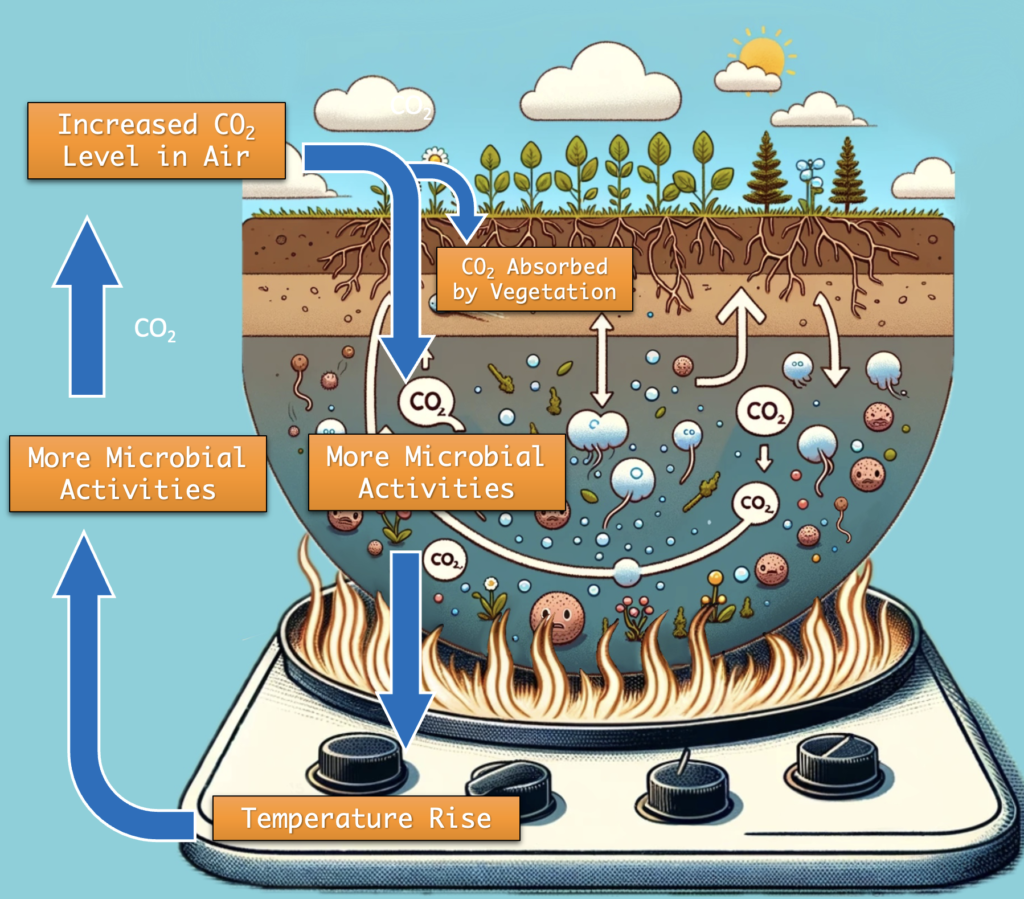Master's Thesis
- Designed and fabricated a cost-effective microfiltration system for sample preparation.
- Employed advanced statistical models, including multivariate regression and principal component analysis, to interpret environmental sample data, yielding insights into pollution dispersion patterns.
- Mentored a team of three undergraduate students, guiding their independent projects and integrating their findings into the broader scope of the thesis research.
- Presented research findings at the American Geophysical Union and Southeastern Biogeochemistry Symposium conferences.
- First-authored a manuscript currently under peer review for publication in the ‘Soil Biology and Biogeochemistry’ journal.

Image showing the positive climate feedback loop. Made by Yaxi Du.
Decoding the Hidden Mechanisms of Soil Carbon Cycle in Response to Climate Change
Climate change is rapidly redefining the biogeochemical dynamics of our planet, particularly in relation to soil organic carbon (SOC) storage and loss. We aim to isolate confounding elements and elucidate the principal mechanisms underpinning SOC dynamics under diverse environmental scenarios: warming (ambient, +1.5°C, and +2.5°C), and nutrient (nitrogen and phosphorus) and carbon addition treatments. Samples were collected from a low-latitude soil warming experiment where warming commenced in 2010 (Whitehall Forest, Athens, Georgia). Under laboratory conditions, we incubated soil samples (22 days) at their respective field temperatures at the time of sample collection.
Core aspects of the soil carbon cycle, including particulate (and mineral-associated) organic carbon, microbial biomass carbon, and microbial necromass carbon, as well as critical processes such as soil microbial respiration and enzyme kinetics were examined. Our systematic evaluations helped separate the direct and indirect effects of warming (e.g., the inherent and apparent temperature sensitivity of SOC formation and loss). Our findings indicate that warming has a minor influence on soil carbon storage in substrate-limited ecosystems. However, as carbon and nutrient inputs increase, soil carbon loss accelerates. This study sheds light on the delicate balance between underlying mechanisms that control SOC dynamics in the face of climate change, emphasizing the nuanced interdependence of temperature, substrate resource availability, and soil carbon dynamics.
Wet lab skills: CO2 Mineralization, Chloroform Fumigation, Enzyme Assays, Enzyme Kinetics, Necromass (Amino Sugar Extraction), 18O-Carbon Use Efficiency Measurement, DNA Extraction, Soil Organic Matter (SOM) Physical Fractionation, TOC/TON, TC/TN
Equipment: Qubit System (Q-S151 CO2 Analyzer), IRGA, ThermoFisher Scientific Elemental Analyzer, Shimadzu TOC-L analyzer, Infinite M Nano+ Model: Infinite 200 Pro(fluorometric), 8000M Mixer Mill, Sorvall ST Plus Series Centrifuge, Qsonica Sonicator Ultrasonic Processor
